June 21, 2025 | 20:46 GMT +7
June 21, 2025 | 20:46 GMT +7
Hotline: 0913.378.918
June 21, 2025 | 20:46 GMT +7
Hotline: 0913.378.918
Vice Chairman of the Kien Giang Provincial People's Committee, Nguyen Thanh Nhan, has just signed a decision to allocate over 232.000 USD to implement the project "Sustainable development of 1 million hectares of high-quality, low-emission rice cultivation linked to green growth in the Mekong Delta by 2030". This funding has been assigned to the provincial Department of Agriculture and Rural Development for execution.
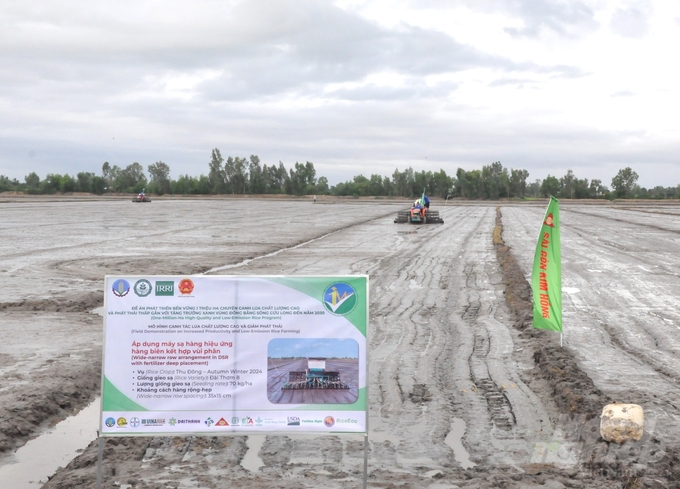
Kien Giang has launched the 1 million hectare high-quality rice project with a pilot model implemented in Tan Hiep district, which will be expanded to other localities thereafter. Photo: Trung Chanh.
Mr. Le Huu Toan, Director of the Kien Giang Department of Agriculture and Rural Development, stated that the province has committed to contributing 200.000 hectares to the project "Sustainable development of 1 million hectares of high-quality, low-emission rice cultivation linked to green growth in the Mekong Delta by 2030."
Specifically, in phase 1 (2024 - 2025), the province aims to establish 60.000 hectares of high-quality, low-emission rice cultivation. In 2024, 30.000 hectares will undergo carbon credit measurement and in 2025, 40.000 hectares will be measured for carbon credits.
In phase 2 (2026-2030), the area will gradually increase each year, aiming to establish 200.000 hectares of dedicated rice cultivation by 2030. This phase will involve reorganizing the production system according to the value chain, improving production efficiency and enhancing the income and living standards of rice farmers, while also protecting the environment, adapting to climate change and reducing greenhouse gas emissions.
To support farmer organizations participating in the project, Kien Giang province has selected two cooperatives in Tan Hiep and An Minh districts. These cooperatives represent areas of dedicated rice production and areas of rice-shrimp rotation production for the pilot model.
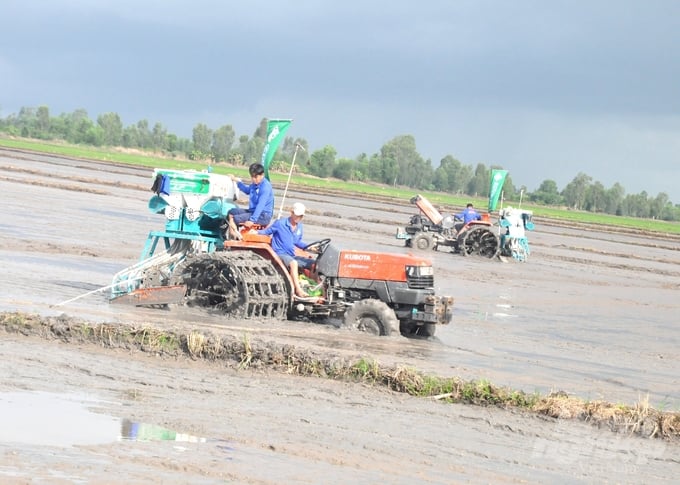
Participating in the 1 million hectare high-quality rice project, farmer organizations are supported to apply synchronous mechanization in production stages, to reduce costs and increase profits. Photo: Trung Chanh.
At the Thanh Nien Phu Haa Agricultural Service Cooperative (Tan Hoi commune, Tan Hiep district), the Kien Giang Provincial People's Committee, in coordination with the Crop Production Department (Ministry of Agriculture and Rural Development), has launched the project for the winter-spring 2024 season on 50 hectares, with 25 participants. The initiative also includes a demonstration of advanced machinery and technology in the pilot model "Low-emission rice cultivation, effective management of straw, water and fertilizer".
Additionally, the Thanh An Shrimp-Crab-Rice Cooperative (Dong Thanh commune, An Minh district) is expected to commence its project in the 2024-2025 crop season, starting in September, on land previously used for shrimp farming.
Following the launch of this pilot model, the Kien Giang Department of Agriculture and Rural Development will lead the expansion to the remaining 10 districts and cities, including: Giong Rieng, Go Quao, Chau Thanh, Rach Gia, Hon Dat, Kien Luong, Giang Thanh, An Bien, Vinh Thuan and U Minh Thuong. Thus, Kien Giang province will have 12/15 districts and cities participating, with the goal of reaching a total area of 200.000 hectares by 2030, as committed to the Ministry of Agriculture and Rural Development.
Members of farmer organizations participating in the pilot model and its expansion will receive state support for 50% of the input costs such as seeds, fertilizers, Trichoderma preparations or other straw-decomposing agents. Support will also be provided for the adoption of mechanization technologies, including row-seeding machines combined with fertilizer application, drone technology for pesticide spraying and alternating wet-dry sensor tubes (AWD). Additionally, there will be support for equipment and costs related to greenhouse gas emission measurement and analysis.
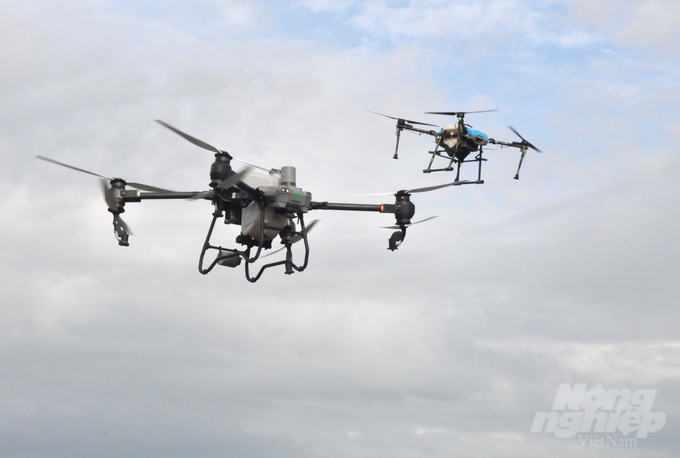
Participating in the project, farmers are supported in applying mechanization such as row-seeding machines combined with fertilizer application, drone technology for pesticide spraying,... Photo: Trung Chanh.
The Kien Giang Agricultural Extension Center and specialized units will conduct training for farmers based on the "Technical process for high-quality, low-emission rice production in the Mekong Delta" issued by the Crop Production Department. The goal is to reduce the seeding rate to below 70 kg/ha, cut chemical fertilizer and pesticide use by 30% and decrease irrigation water by 20% compared to traditional cultivation methods.
To ensure sustainable farming, 100% of the area will apply at least one advanced cultivation practice such as "1 Must and 5 Reductions", SRP (Sustainable Rice Platform), alternating wet and dry irrigation and other certified Good Agricultural Practices (GAP) standards, which will be assigned a regional code.
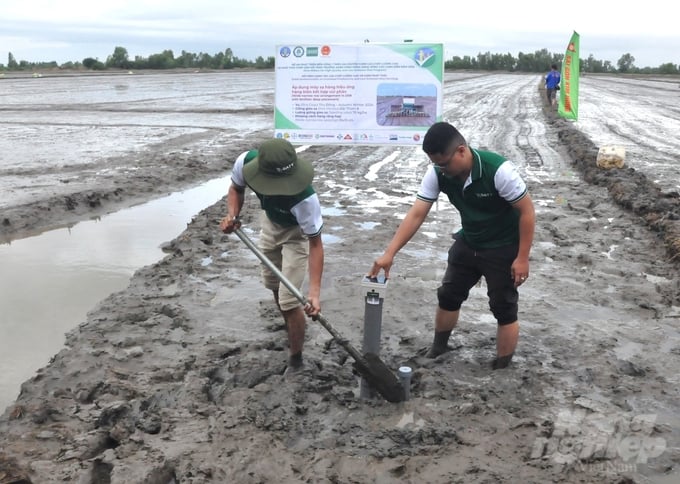
The fields in the pilot model participating in the 1 million-hectare high-quality rice project will be provided with moisture sensor tubes to monitor water levels in the fields. The technique of alternating wet and dry irrigation (AWD) will be applied, aiming to reduce water usage by 20% compared to traditional cultivation practices. Photo: Trung Chanh.
Regarding production organization, 100% of the area dedicated to high-quality, low-emission rice cultivation will combine with businesses and farmer organizations in both production and product marketing. Environmental protection and green growth will be emphasized, with efforts to reduce post-harvest losses to below 8%. All straw will be collected from the fields and processed for reuse. Greenhouse gas emissions will be reduced by over 10% compared to traditional rice cultivation practices.
Develop a sustainable rice value chain with a 40% increase in value addition along the chain, achieving a profit margin of over 50% for rice farmers. Furthermore, ensure that high-quality, low-emission rice exports make up more than 20% of the total rice export volume from the specialized cultivation region.
Translated by Phuong Linh
![Turning wind and rain into action: [11] Ten years before storms, after every harvest](https://t.ex-cdn.com/nongnghiepmoitruong.vn/608w/files/news/2025/06/20/z6704423696987_15fd32ffc26d590d204d520c9dac6786-nongnghiep-140922.jpg)
(VAN) With WeatherPlus, every raindrop and every breeze carries a message. And if we learn to listen, the fields will no longer live in fear of the weather.
![Turning wind and rain into action: [10] Advancing accessible climate services for farmers](https://t.ex-cdn.com/nongnghiepmoitruong.vn/608w/files/linhnhp/2025/06/20/1911-z6704423696987_15fd32ffc26d590d204d520c9dac6786-nongnghiep-161854.jpg)
(VAN) Not only does it help farmers 'avoid droughts and rains,' the development of agricultural climate services also enhances their ability to proactively adapt to a rapidly changing climate.
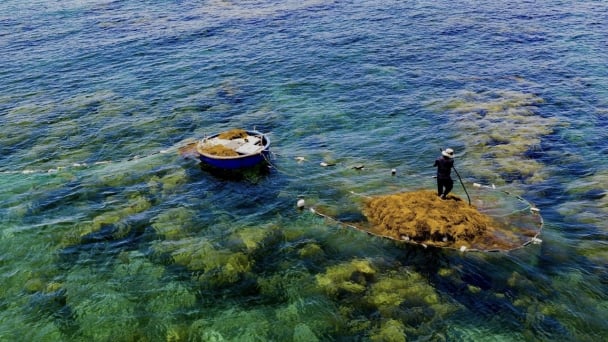
(VAN) With international assistance, the harvesting of sargassum seaweed in Quang Ngai has become increasingly regulated, thereby safeguarding marine life and ensuring the stability of coastal communities' livelihoods.
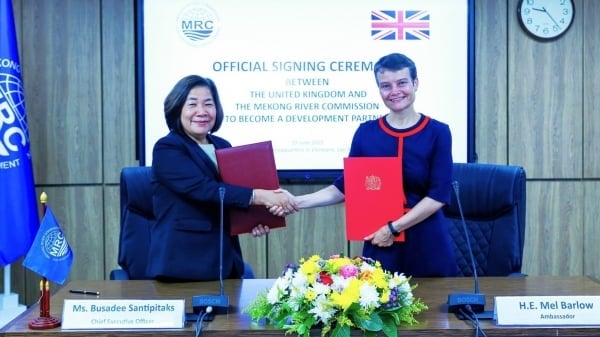
(VAN) On June 19, the United Kingdom officially became a Development Partner of the Mekong River Commission.

(VAN) Biodiversity is being threatened by traditional remedies made from wildlife. Traditional medicine and humans must change to live in harmony with nature.

(VAN) Agrifood investment and finance solutions for people and the planet.

(VAN) Microplastic contamination has become pervasive in seafood, posing unprecedented challenges for food safety and marine ecosystems.